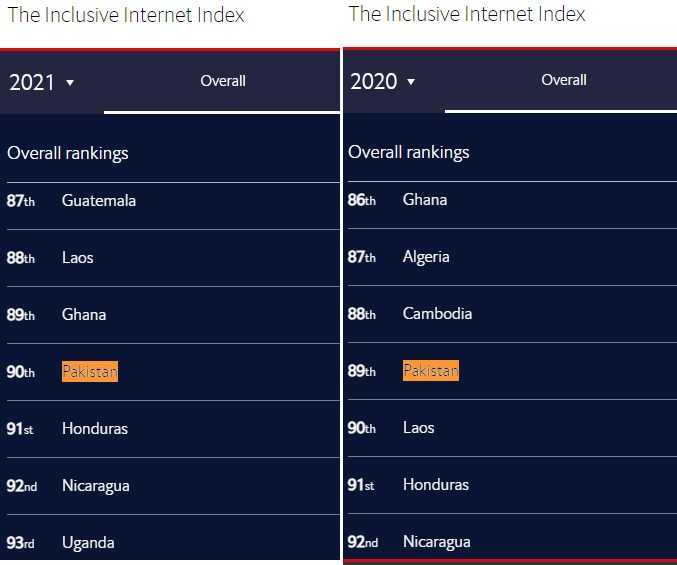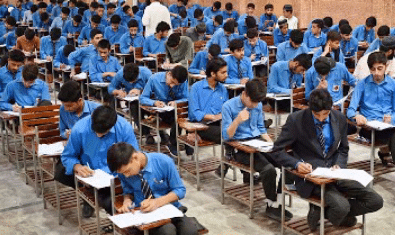Pakistan has dropped down to 90th ranking on the “Inclusive Internet Index” in 2021, one point down from 89th in 2020, among 120 countries, according to a global report by the Economist Intelligence Unit (EIU).
The index measures the overall score based on the factors of the “Availability, Affordability, Relevance and Readiness” categories. The report includes 120 countries encompassing 98 percent of global GDP and 96 percent of the global population.
Director Telecommunication Development Bureau at International Telecommunication Union, Doreen Bogdan-Martin, announcing the release of the report, said that the newly launched 2021 Facebook and the EIU Index makes a strong case for universal and meaningful connectivity. “Pleased to see ITU data put to good use in the spirit of digital cooperation,” she said.
#Digital is here to stay!
The newly launched 2021 @Facebook & @TheEIU #InclusiveInternetIndex makes a strong case for universal, #MeaningfulConnectivity.
Pleased to see @ITU data put to good use in the spirit of #DigitalCooperationhttps://t.co/DX5e0Nzksd— Cosmas Zavazava (@ITUBDTDirector) April 13, 2021
Other countries in South Asia were all ranked above Pakistan, with India at 49 (up from 52 in 2020), Sri Lanka at 77, Bangladesh at 82, and Nepal at 83.
Pakistan also fell behind compared to other regional states like Iran, which ranked 57 among the 120 countries.
The Inclusive Internet Index, commissioned by Facebook and conducted by the Economist Intelligence Unit, is published for a fourth year in 2021. The 2021 index report highlights that the overall ranking of Pakistan was 90, against 89 in 2020 and 77 out of 100 countries in the index report 2019. The top contenders on the list have been the United States and Sweden, with stiff competition between the two countries for the top two slots over the past three years.
The EIU has reported that at 90th place overall, Pakistan ranks in the bottom quartile of the index and second to last in the Asia region.
The “Gender Gap in Internet Access” between male and female was 65 percent, and the gap between male and female access to mobile phones was 51 percent.
However, the EIU has said that Pakistan ranked highest in the “Affordability” pillar. This is due to improvements in the competitive environment and a decrease in mobile phone costs.
In the “Affordability” category, which examines the cost of access relative to income and the level of competition in the internet marketplace, Pakistan ranked 67th.
In the “Readiness” category, Pakistan was at 79th position, which examines the capacity to access the internet, including skills, cultural acceptance, and supporting policy.
However, in the “Relevance” category, Pakistan remained low at 91st position with respect to the existence and extent of local language content and relevant content.
The “Availability” category also saw Pakistan rank low at 97th position, with metrics of quality and breadth of available infrastructure required for access and levels of internet usage.
Pakistan also has low internet quality and ranks at 91st position. This category measures the quality of experience while using the internet.
Aamir Ibrahim, CEO of Jazz, highlighted the affordability of smartphones as the biggest barrier to the provision of internet connectivity to the lower-income segments of society.
He said, “Keeping in view that majority of the local manufacturers are producing 2G handsets, policy interventions should prioritize assembly of 4G compatible smartphones while banning the production and import of 2G-only phones.”
Jazz CEO also said that policy intervention was needed to allow the operators to sell smartphones in installments with a loan recovery mechanism to customers, and to ensure loan recovery.
“Also It is time to get rid of 3G which is obsolete and go for the rollout of 4G network across the country. Pakistan requires a strong digital infrastructure that is robust fiber and reliable 4G at a decent speed. Compared to neighboring countries, Pakistan has assigned significantly less spectrum to operators impacting the delivery of 4G speeds. Additional spectrum should be allocated free of cost to operators to speed up digital adoption. The government can work on an alternative pricing mechanism where it can share revenue from broadband services rather than burden operators upfront, Aamir Ibrahim, CEO, Jazz
Telecom industry players in Pakistan believe that Pakistan needs to take radical measures at the policy level, considering that still, a significant number of users lack access to modern devices and connectivity. A large number of Pakistani customers still use basic voice-only devices. A digital revolution is difficult when a large number of people in the country own 2G-only handsets, the experts noted.




























i wonder how they are gathering this data, if it is based on SIM card ownership then the data most likely has major gaps, here it is a trend for male relatives to get SIMS for wives, mothers, sisters in their own name, its usual for a man to have all the SIMS possible issued and they are distributed to other family members, next there are those households with a single phone which is mostly kept at home and everyone uses, how is this chalked up? in case of affordability and even availability of smart phones, we have plenty of cheap options not negating the opinion of respectable mr aamir ibrahim but smart phones are a priority for low income people too and they buy them used / repaired / lower end models, a good smart phone can be had for under 5000 PKR & people are willing to spend 5K.